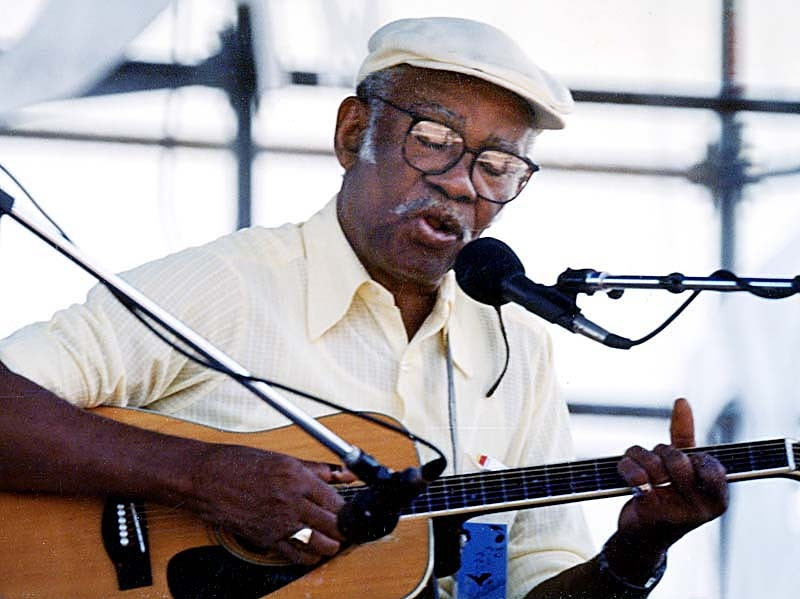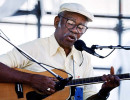Moses Rascoe
Moses Rascoe
Moses Rascoe (1917-1994) got his first guitar in North Carolina at the age of 13 and turned professional in Pennsylvania some 50-odd years later. In between, he traveled the roads as a day laborer and truck driver, playing guitar only for "a dollar or a drink," as he told Jack Roberts in Living Blues. But he'd picked up plenty of songs over the years, from old Brownie McGhee "Piedmont blues" to Jimmy Reed's '50s jukebox hits, and when he retired from trucking at the age of 65, he gave his music a shot. The local folk-music community took notice, as did blues and folk festivals from Chicago to Europe. Rascoe recorded his first album live at Godfrey Daniels, a Pennsylvania coffeehouse, in 1987.
It was in 1983 that the retired. Rascoe, then 66, began a new career in music. "Back in the early 1980s, you know, I played in some colleges in Pennsylvania and Ohio. You know, the colleges have these folk festivals and I played for a number of them," he said.
After hooking up with agent Helen Kyriakos, who also manages Ellen McIlwaine, Rascoe's career took off. He's opened up for Dave Van Ronk, David Bromberg, and Rory Block, among others. This summer his music highlighted folk festivals in Mariposa, Canada, Newport, Rhode Island, Philadelphia, and Bethlehem. An especially well-received performance at Bethlehem's Godfrey Daniels has been captured on vinyl and released by Flying Fish Records.
While it's true that Rascoe is new to the business of music, he is by no means unaccustomed to the spirit of it. Even before he knew the mournful chords and couplets of the blues, Rascoe was singing and finger-picking the popular country & western tunes of the day. "See when I first started out I was playing country. I didn't know no blues. Country was all I heard on the radio so country was what I played," Rascoe explained.
With country music so pervasive in the Deep South, how did Rascoe learn the blues? "See, in North Carolina, a lot of fellows played the blues. I bought my first guitar when I was 13 from Montgomery Ward but I couldn't get out nowhere, you know. The only thing I could do was go with my father when he went into town. He'd let me stand around and listen to them play. Some fellows showed me some keys and I stayed with those keys for some time," Rascoe said.
Arrested for street fighting at 18, Rascoe was sentenced to work on a chain gang. Of the experience, he will only say, "Then I had some time down in the chain gang in North Carolina and I made nine months in there. All those fellows in there played the blues."
With his blues style nearly cemented, he began playing local juke joints, nightclubs, and speakeasies, often for no more than $1.25 a night and a few free drinks. During the day, he'd work construction jobs or drive trucks for his father. "My Daddy had trucks. I drove them before I had a driver's license. Driver's licenses didn't come out in North Carolina until around '35 or '36. Down there all you had to be was old enough. Didn't matter much about your age as long as you could handle it," he said.
Like the blues itself, Rascoe eventually moved north, settling in York, Pennsylvania a town just a few miles above the Mason-Dixon line. Rascoe explained his reason for leaving the Confederate warmth: "My mother and father moved up to York. Doggone, I was in my 20s when I moved up there. I didn't want to be far from them."
The blues, embodied by Muddy Waters and Howlin' Wolf, didn't stop in Pennsylvania but kept moving straight through to Chicago, a place where the frosty winds soon deadened many dreams. Walter Crockett, who penned the liner notes for Rascoe's new LP, has a succinct way of describing what happened to the blues after it moved north and went electric. The blues "was transformed into jazz by Mose Allison, to rock 'n' roll by Elvis Presley, to 'folk-blues' by Tom Rush and Dave Van Ronk and to rock by the Rolling Stones and Led Zeppelin."
Rascoe, though, has preserved the original sound of the acoustic rural blues, a style pioneered by figures as diverse as Charlie Patton, Son House, Robert Johnson, and Blind Lemon Jefferson. Like those great bluesmen, Rascoe tries to keep things simple. "All the songs I sing, I also fingerpick, I try to make the guitar come right along with me. The guitar says just about what I said," he said.
(Moses Rascoe at River Blues Fest, Philadelphia 1988)





